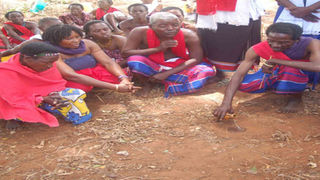
Kaya Elders appeasing the dead at Kaya Kauma on September 19, 2013.
| File | Nation Media GroupKilifi
Premium
Inside plans to cleanse Shakahola Forest
Mijikenda elders are making elaborate plans to cleanse the vast Shakahola forest where more than 400 deaths from a religious cult were discovered.
The Kilifi Kaya elders had planned to hold a cleansing ritual but were unable to do so because the area is currently off-limits. But an ad hoc Senate committee investigating the deaths recommended that the Kilifi County government facilitate the elders' rituals. The elders have said they are ready once given the go-ahead.
According to Mijikenda Kaya Elders Association coordinator Tsuma Nzai, the ritual will involve the three groups of Kaya elders from the larger Giriama tribe.
Speaking exclusively to the Nation, Mr Nzai said the exact location for the rituals would be determined by the gods.
"Since it is Giriama land that was defiled, the rituals will involve Kaya elders from Weruni, Galana and Godoma Kayas," he said.
Mr Nzai said a team of elders would first survey the forest and, with the guidance of the gods, determine the place for the special rituals.
"The elders will travel to all the corners of the forest and will only settle on a site as directed by the gods. They will install a pot with a concoction of herbs and that is when we shall officially commence the rituals," he said.
Some of the items needed are a red bull with a white head, a white sheep, a red goat, and black, white and red chicken. A black bull and a white he-goat will also be slaughtered.
"We are using the red bull with white head since it's a cleansing ritual and it would be used to offer the sacrifice and appease the gods, accompanied by prayers for peace," he explained.
There are also special dances – ngoma ya kiganga and ngoma ya pini. The two dances are usually performed when elders want to determine the cause of a spell and when they want to cast it away.
The chairman of the Mijikenda Kaya Elders Association, Mzee Mwalimu Mwinyi, said the special rituals are usually only performed on a Thursday or Sunday.
He explained that men and women wearing traditional Mijikenda attire perform separate rituals on different days.
"These cleansing rituals are special to the Mijikenda community since it's meant to appease the gods, and that's why it must be done accordingly to avoid another spell," he said.
According to a report by the committee, chaired by Tana River Senator Danson Mungatana, the Kilifi County Assembly Committee had informed senators that the Kaya elders had planned to gather at Shakahola to hold traditional prayers and cleanse the area.
“The challenge encountered by the Kaya elders was that the cleansing is required to be performed inside the forest which they cannot access due to its status as a restricted area,” the report says.
The committee recommended that the Kilifi County government facilitate the Kaya elders to carry out the traditional cleansing of the forest land where the tragedy took place and to erect a memorial in the area to honour those who lost their lives.
The Shakahola forest area is located about 100 kilometres north of Malindi Sub-county and borders Tsavo East National Park. It is on the edge of a human settlement that borders a forest that runs through Tsavo East National Park.
Shakahola is within the Chakama Ranch owned by Chakama Ranching Company Limited (in liquidation).
The main suspect in the massacre, Pastor Paul Makenzie, allegedly moved to Shakahola in 2020 after irregularly acquiring 800 acres of land from Chakama Ranching Company Limited.
According to the report, Mackenzie, 47, began his career as a taxi driver in Malindi between 1995 and 2011.
He was initially a member of the Catholic Church before joining the African Brotherhood Church (ABC) and later moving to the Ushindi Baptist Church after a falling-out with the ABC leadership.
He founded Good News International Ministries in 2003.
Mackenzie began preaching and operated his ministry informally for seven years before it was registered and duly issued with a certificate in September 2010. In 2019, he and his three associates moved to Shakahola Forest.




